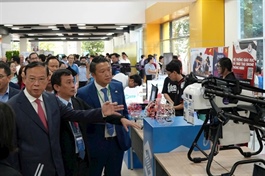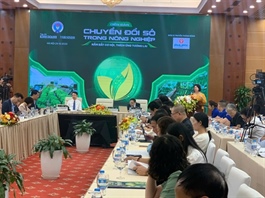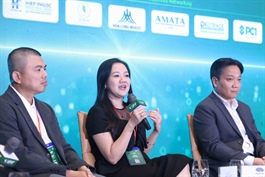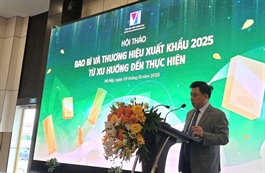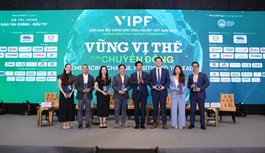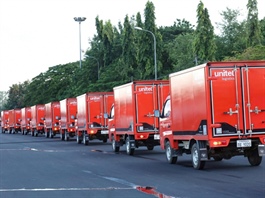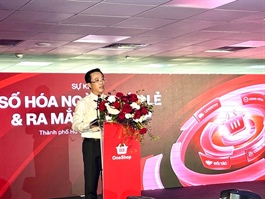EVN and MoIT drive Vietnam’s green energy transition under Resolution 70
EVN and MoIT drive Vietnam’s green energy transition under Resolution 70
Vietnam Electricity (EVN) is investing in clean power and digital transformation, while the Ministry of Industry and Trade is streamlining policies to unlock investment in renewables and smart grids, all geared towards a carbon-neutral future under Resolution 70.
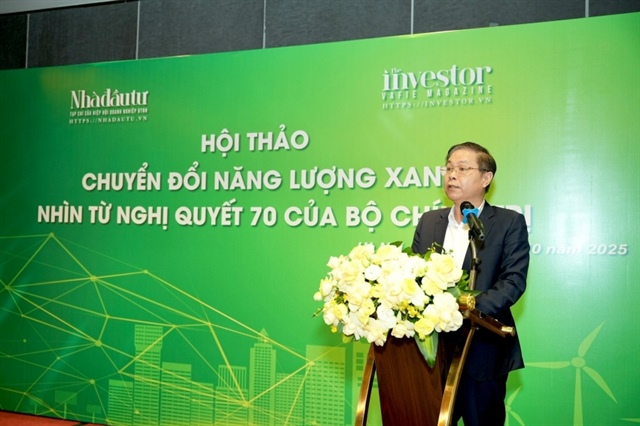
Tran Hoai Trang, deputy director general of the Electricity and Renewable Energy Authority |
At a conference held in Hanoi on October 30, Tran Hoai Trang, deputy director general of the Electricity and Renewable Energy Authority under the Ministry of Industry and Trade (MoIT), announced that the ministry is finalising a draft National Assembly resolution to address challenges in national energy development for 2026-2030, expected to be submitted to the 10th National Assembly session later this month.
“Once adopted, this resolution will create a transparent legal corridor, accelerate power projects, and ensure supply in the context of Vietnam’s strong economic growth,” Trang highlighted.
According to the MoIT, electricity demand will surge during 2026-2030 to sustain Vietnam’s targeted double-digit economic growth. To meet that demand, the draft resolution proposes several mechanisms, including flexible adjustment of power development planning to meet real-world conditions; reducing administrative procedures and shortening project preparation time; incentives for build-operate-transfer, LNG-to-power, and offshore wind projects; and promoting direct power purchase agreements to attract private-sector participation.
“Without timely solutions, Vietnam could face electricity shortages affecting production, livelihoods, and national energy security,” he said.
October 30 was the deadline for the MoIT to submit the National Assembly's resolution to the government. In the draft, the MoIT has identified and addressed several legal bottlenecks related to current laws such as the Law on Electricity, the Land Law, the Law on Natural Resources, the Construction Law, and the Planning Law. These laws contain inconsistencies in defining eligible investors for power generation and transmission projects, creating obstacles that have directly affected the progress of implementing the adjusted Power Development Plan VIII.
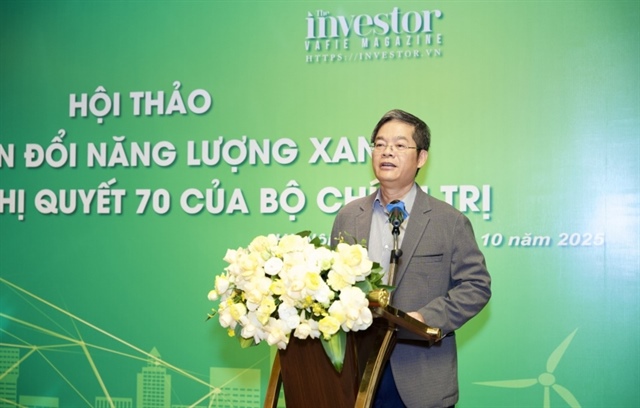
Nguyen Tai Anh, deputy general director of EVN |
Nguyen Tai Anh, deputy general director of the EVN, emphasised that EVN is intensifying key measures to help achieve the national goal of reducing greenhouse gas emissions by 15-35 per cent by 2030.
“Developing clean power sources will ensure Vietnam’s energy security,” he said.
For ongoing coal-fired power plants, EVN is upgrading technology, integrating renewable energy, and improving efficiency to reduce emissions. The group is also studying fuel transition plans, including co-firing biomass and ammonia, and is developing a long-term roadmap towards carbon neutrality.
At the same time, EVN prioritises the development of low-emission energy sources such as nuclear power, green hydrogen, green ammonia, and biomass, while collaborating with Japan and South Korea to enhance generation efficiency.
EVN is investing in smart grid systems to strengthen transmission capacity, minimise energy losses, and cut emissions. The utility is also researching energy storage technologies and regional grid interconnections.
“With an annual investment scale of $3-4 billion, EVN needs broader participation from domestic and international partners,” he added.
EVN is also expanding the use of AI, big data, and digital technologies in operation and management to optimise production and energy use. The group considers energy efficiency a mandate of our time, promoting nationwide electricity-saving programmes, load adjustment initiatives, and green transition awareness campaigns.
EVN is currently conducting greenhouse gas inventories, researching carbon capture and storage solutions, and preparing to join domestic and international carbon credit markets.
The group focuses on developing high-quality human resources for clean energy, nuclear power, and smart grid operations. In parallel, EVN is enhancing international cooperation and mobilising green finance and Just Energy Transition Partnerships funds, as well as other preferential loans, to accelerate Vietnam’s energy transition.
The joint efforts of EVN and the MoIT in implementing Resolution 70 demonstrate Vietnam’s commitment to a green, modern, and self-reliant energy transition. Beyond ensuring energy security, the goal is to reduce emissions, protect the environment, and foster green economic growth, moving towards the nation’s pledge of achieving net-zero emissions by 2050.
- 09:36 31/10/2025







